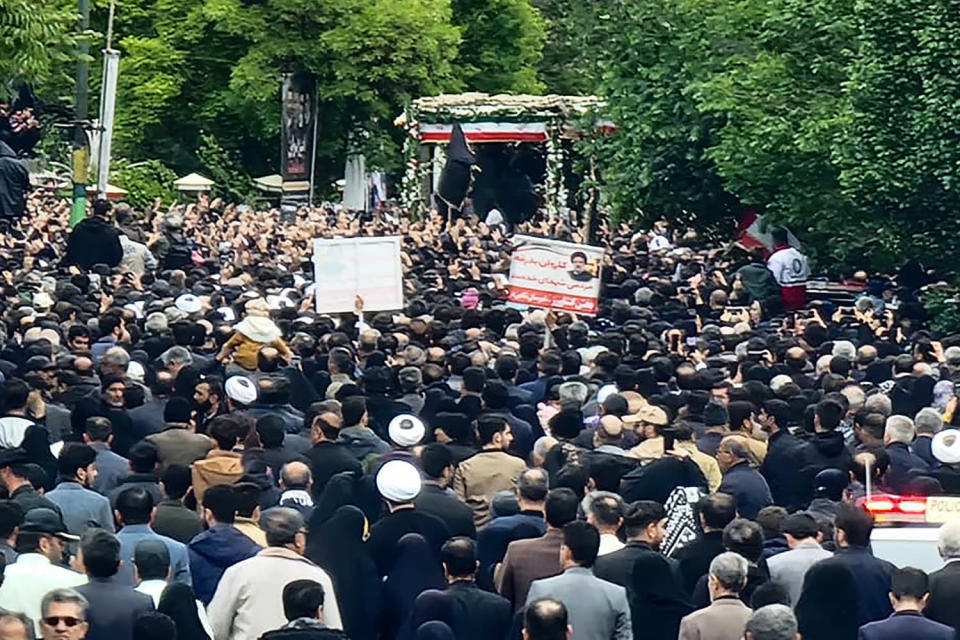Iran begins funerals for president after helicopter crash
- Oops!Something went wrong.Please try again later.
- Oops!Something went wrong.Please try again later.
- Oops!Something went wrong.Please try again later.
Iran began funeral processions Tuesday for President Ebrahim Raisi, as the country grapples with the fallout from his sudden death at a time of heightened regional tensions and domestic uncertainty.
Supreme Leader Ayatollah Ali Khamenei has declared five days of national mourning for Raisi, Foreign Minister Hossein Amirabdollahian and six others killed in the helicopter crash in a remote part of northwest Iran on Sunday. The shock incident wiped out two of the Islamic Republic's key political figures, raising questions about its leadership beyond Khamenei, its ultimate authority.
Thousands of mourners gathered for the first funeral procession early Tuesday in Tabriz, the closest major city to the crash site. The bodies of those killed will then be taken to the holy city of Qom in the afternoon.

Wednesday will be a public holiday as a funeral for Raisi will be held in the capital, Tehran, and funerals will be held in two more cities on Thursday. Raisi is expected to be laid to rest in the holy city of Mashhad on Friday.
Raisi’s unexpected death led to scenes of mourning in Iran on Monday, as messages of condolences poured in. But some also expressed relief at the death of Raisi, 63, who was known by some for presiding over brutal crackdowns on political opponents and protesters.
In a short statement late Monday, the State Department said the United States expressed its “official condolences” for the deaths of Raisi and the seven others killed. “As Iran selects a new president, we reaffirm our support for the Iranian people and their struggle for human rights and fundamental freedoms,” the statement added.
State Department spokesman Matthew Miller was grilled by reporters Monday about whether the statement sent conflicting messages. He also said that Raisi was a “brutal participant” in the repression of the Iranian people for nearly four decades, including human rights abuses against the women and girls during his tenure as president. But he added: “We regret any loss of life. We don’t want to see anyone die in a helicopter crash.”
Miller also confirmed that the Iranian government had asked the United States for assistance in the aftermath of the crash. Washington agreed to offer assistance, Miller said, but ultimately was not able to provide it, largely for logistical reasons.
The United Nations Security Council, of which the U.S. is a permanent member, also held a moment of silence for Raisi Monday.
Iran’s first vice president, Mohammad Mokhber, was quickly named a temporary caretaker ahead of an election to choose a new president that has to take place in the next 50 days. Iran has not offered an official cause for the crash that killed Raisi, but there has been no suggestion of foul play.
The late president was among the top contenders to replace Khamenei, sparking fears of a succession crisis in Iran amid already heightened tensions in the region in the aftermath of the Oct. 7 attack on Israel by Iran-backed Hamas and the war in Gaza.
This article was originally published on NBCNews.com

